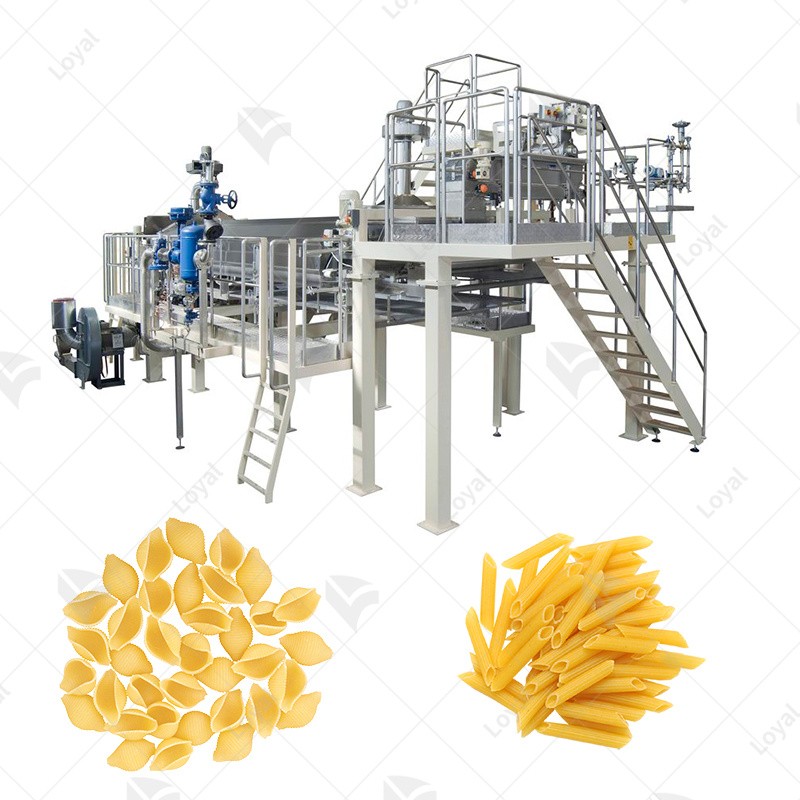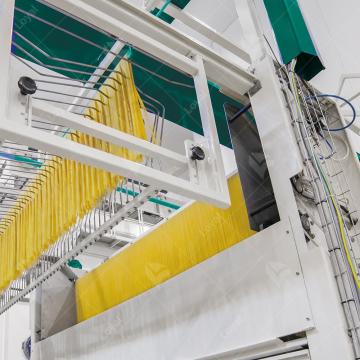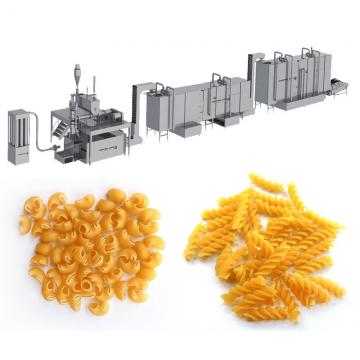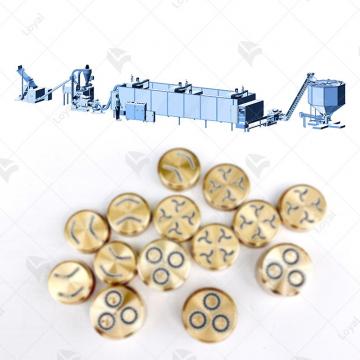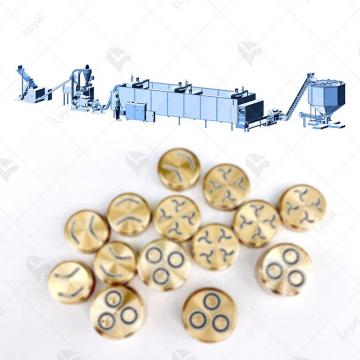Embracing Innovation: The Future of Macaroni Making Process with Fully Automated, High-Efficiency Equipment
Embracing Innovation: The Future of Macaroni Making Process with Fully Automated, High-Efficiency Equipment
Shandong Loyal Industrial Co., Ltd. has incorporated advanced technologies from Pasta Technologies Group (PTG) and lazzaretti in the production of its macaroni.The macaroni production landscape is on the verge of a revolutionary transformation, propelled by the integration of fully automated, high-efficiency equipment. This introduction establishes the theme, setting the tone for an exploration into the future of the Macaroni Pasta Production Line. The spotlight is on the innovative strides made possible through cutting-edge technology, promising a paradigm shift in macaroni manufacturing.

Unveiling Fully Automated Macaroni Making Process Equipment
Delving into the heart of innovation, this section unveils the intricacies of fully automated equipment specifically designed for the macaroni making process. Precision pasta extruders, advanced mixing systems, and other components take center stage, redefining the benchmarks of efficiency and quality in macaroni production. The narrative focuses on how these technological marvels reshape the landscape of macaroni manufacturing.
Efficiency Redefined: The Impact of Automation on the Macaroni Making Process
Exploring the profound impact of automation, this section unveils the strides made in enhancing the efficiency of the macaroni making process. High-speed production, precise ingredient measurements, and seamless coordination between components stand out as the hallmarks of advancements brought by fully automated equipment. The narrative aims to showcase how these innovations collectively elevate the overall efficiency of macaroni production.
Sustainability in Focus: Energy-Efficient Practices in Macaroni Making
As the journey into the future unfolds, sustainability takes center stage. This section scrutinizes how fully automated, high-efficiency equipment aligns with energy-efficient practices in the macaroni making process. From reducing environmental impact to optimizing resource usage, these innovations contribute to a more sustainable and eco-friendly approach to macaroni production.
Realizing the Potential: Case Studies of Successful Implementation
To bring the narrative to life, this section presents compelling case studies of companies that have successfully implemented fully automated, high-efficiency equipment in their macaroni making process. The focus is on tangible benefits such as increased productivity and enhanced product quality, providing valuable insights into the real-world applications of these groundbreaking advancements. Brands like Banza, Colavita, Garofalo, Pastificio Di Martino, and Rao's Homemade serve as exemplars of successful implementation.

Overcoming Challenges: Navigating the Transition to Fully Automated Macaroni Making
The transition to fully automated macaroni making processes is not without its challenges. Technical hurdles, such as the integration of complex machinery and software systems, often pose initial obstacles for manufacturers. Overcoming these challenges requires a comprehensive understanding of the technology, accompanied by strategic planning and training programs. Collaborative efforts with technology providers and continuous support during the transition play a pivotal role in ensuring a smooth and successful adoption of fully automated macaroni making processes.
Another significant challenge lies in the training requirements for personnel. The shift to fully automated processes necessitates a skilled workforce capable of operating and maintaining advanced machinery. Manufacturers invest in extensive training programs to equip their staff with the expertise needed to navigate the intricacies of the automated systems. This investment not only addresses the immediate challenges but also ensures the long-term sustainability and effectiveness of the fully automated macaroni making process.
Financial considerations also contribute to the challenges of transitioning to full automation. The initial setup costs for acquiring and installing advanced equipment can be substantial. However, forward-thinking manufacturers recognize the long-term benefits, including increased efficiency and reduced operational costs. Strategic financial planning, government incentives, and collaboration with financial institutions are avenues explored by manufacturers to mitigate these financial challenges.
The Road Ahead: Anticipating Future Trends in Macaroni Making Technology
As we look towards the future, several exciting trends are anticipated in macaroni making technology. One prominent trend is the integration of artificial intelligence (AI) into the production process. AI algorithms will optimize production parameters, predict maintenance needs, and enhance overall system efficiency. Advanced materials, including eco-friendly and sustainable options, are expected to play a crucial role in shaping the future of macaroni making. The incorporation of smart sensors and real-time data analytics will further refine the production process, allowing for adaptive and responsive manufacturing systems.
Additionally, the road ahead includes advancements in precision engineering and robotics, contributing to the development of more compact and versatile macaroni making equipment. Collaborations between technology providers and food scientists may lead to innovations that enhance the nutritional value and quality of macaroni products. The integration of automation beyond the production floor into areas such as packaging and distribution is another trend to watch, ensuring a holistic and streamlined approach to macaroni manufacturing.
In summary, anticipating these future trends in macaroni making technology is crucial for manufacturers seeking to stay at the forefront of innovation. Embracing these advancements promises not only increased efficiency but also a more sustainable and adaptive approach to macaroni production. As the industry evolves, the road ahead presents a landscape of possibilities, where technology continues to redefine the macaroni making process, setting new standards for excellence and sustainability.
Conclusion
In conclusion, "Embracing Innovation: The Future of Macaroni Making Process with Fully Automated, High-Efficiency Equipment" encapsulates a transformative journey within the macaroni manufacturing industry. The integration of cutting-edge technology not only redefines efficiency but also shapes a more sustainable and innovative future for macaroni production. This conclusion synthesizes key insights, emphasizing the pivotal role of fully automated equipment in shaping the landscape of macaroni making, setting new standards for excellence and sustainability.

FAQs: Common Questions about Macaroni Making Process
1. Q: How does fully automated equipment enhance the efficiency of the macaroni making process?
A: Fully automated equipment ensures high-speed production, precise ingredient measurements, and seamless coordination between components, collectively elevating the overall efficiency of macaroni production.
2. Q: Which brands have successfully implemented fully automated, high-efficiency equipment in their macaroni making process?
A: Notable brands such as Banza, Colavita, Garofalo, Pastificio Di Martino, and Rao's Homemade have embraced and benefited from the advanced technology in macaroni production.
3. Q: What challenges do manufacturers face in transitioning to fully automated macaroni making processes?
A: Technical hurdles and training requirements pose challenges, but understanding and overcoming these obstacles are crucial for successful integration.
4. Q: What are the anticipated future trends in macaroni making technology?
A: Future trends include the integration of artificial intelligence, advancements in materials, and processes that enhance the efficiency and sustainability of the macaroni making process.

